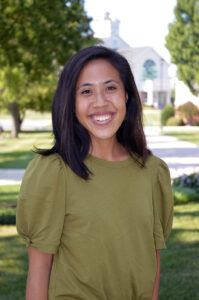Christiana “Ana” (Kurashige ’17) Machida came a long way from home to attend Lancaster Bible College | Capital Seminary & Graduate School to study social work—about 5,000 miles in fact. Today, she’s back in her Oahu home helping those who need social work services in her community.
After graduating from LBC | Capital, Ana earned her master’s degree in social work from the University of Hawai’i, worked for two years in the Hawai’i welfare system and is now working at a new position that will allow her to be involved in housing.
How did Ana find Lancaster Bible College from Hawai’i? Believe it or not, she saw a listing for LBC in a college catalog. Read more about Ana, hear her passion for the social work field, discover how important graduating from LBC | Capital’s accredited social work program was to her, and learn about the difference she’s making in her community.
 LBC | CAPITAL: Please tell us why you decided to come to Lancaster Bible College from Hawai’i!
LBC | CAPITAL: Please tell us why you decided to come to Lancaster Bible College from Hawai’i!
ANA (KURASHIGE ’17) MACHIDA: I decided to come to Lancaster Bible College because I wanted to pursue an education at a Christian college and experience life outside of Hawai’i as it exposed me to a culture different from my own.
LBC: Many people probably think of Hawaii as an idyllic place to live and work, but what are some of the social work issues you encounter?
AM: Hawai’i’s monarchy was illegally overthrown in the 1890s. The historical trauma for the Native Hawaiian people from this event and the actions that followed continue to harm the Native Hawaiian community, as they were once a thriving, progressive and innovative nation before they were betrayed. The loss of their land has resulted in systemic racism against Native Hawaiians, and they are often overrepresented in prisons, the foster care system and the homeless population. Additionally, many foreign investors will purchase land in Hawai’i, causing the price of land to skyrocket. Locals often cannot compete with foreign investors or wealthy individuals who buy property in Hawai’i who have no roots on the islands. Due to this, many locals are forced to move to the continent or become houseless.
LBC: What does your new position entail, and how are you able to impact your community?
AM: At my new position, I am an outreach case manager for a non-profit that works with the homeless community. We meet homeless individuals where they are, build connections and offer them case management to assist them in obtaining benefits, mental health services, income and eventually housing! The areas I encounter clients are near where I grew up and where I live now. It is an honor to serve my own community and assist in providing solutions to what often feel like hopeless situations. Because we enter encampments and find those who are homeless, I walk into spaces most people try to avoid. Whenever we meet new individuals, we have the opportunity to affirm their dignity and worth and show them they are loved by providing items such as food, hygiene items and clothes. Once we have established trust, we can begin connecting them to appropriate services. I feel like I am making an impact because I am working toward the goal of ensuring Hawaiians have homes in their own land.
LBC: How did graduating from an accredited social work program like LBC | Capital’s prepare you both for graduate school and for working in the professional world?
AM: Graduating from LBC allowed me to major in both Biblical Studies and in social work. I truly believe Jesus’ commands validate the profession of social work, and getting to study both the Bible and social work equipped me to love Jesus and others well. The program challenged me to advocate for justice and to love the underserved, as these are topics near to Jesus’ heart. Furthermore, because the LBC social work program is accredited, I was able to graduate with a Bachelor’s in Social Work (BSW). This allowed me to apply for Advance Standing at any accredited university for my master’s, meaning I could choose to pursue my Master’s in Social Work (MSW) in one year instead of two years since the Council of Social Work Education allows students who graduated with a BSW from any accredited school to waive one year from their MSW education. I chose to obtain my MSW at the University of Hawai’i (UH) as I had returned home. The transition from LBC to UH was extremely smooth, as my LBC professors had taught me all I needed to know to begin my master’s education. I still remember everything my LBC social work professors taught me, and I feel like I have been able to thrive in professional settings because of their gift in training us to be compassionate, bold and creative change-agents in our communities.
LBC: What aspect did you appreciate most about LBC | Capital?
AM: I appreciated the intentionality of all the staff and faculty at LBC. My professors, coaches and the Residence Life staff chose to invest in me, disciple me and care for me. Since I was thousands of miles away from home, it felt comforting to be hosted by staff and treated to dinners by professors. To this day, I will never forget the hospitality I received while at LBC | Capital, and it shapes the way I welcome people in my home.